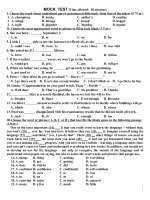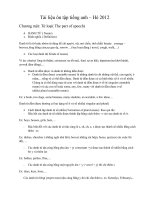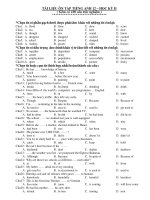- Trang chủ >>
- Luật >>
- Luật thương mại
Tài Liệu Ôn Tập Tiếng Anh Tích Hợp Khối 4
Bạn đang xem bản rút gọn của tài liệu. Xem và tải ngay bản đầy đủ của tài liệu tại đây (320.15 KB, 5 trang )
<span class='text_page_counter'>(1)</span><div class='page_container' data-page=1>
1
<b>Answer Key </b>
<b>Text 1: Computer</b>
<b>A. Comprehension: </b>
1. Write T for true, or F for false.
a. The first computers were very small. F
b. The first computers could only do basic mathematics. T
c. Jack Kilby made the first microchip. T
d. Computer games weren’t popular in the 1980s. F
e. Tim Berners-Lee invented the first smartphone in 1989. F
f. People can play games on smartphones. T
2. Answer the following questions:
a. What sort of things can people do on a computer?
People can play games, do your homework, do mathematics, find information on the
internet, chat to friends etc.
b. Why weren’t there any laptops in the 1950s?
Computers were too big to carry.
c. What do microchips do?
Microchips store information.
d. Why did many people buy computers in the 1980s?
Many people bought computers in the 1980s to play games.
e. What did Tim Berners-Lee invent in 1989 and why was his invention important?
</div>
<span class='text_page_counter'>(2)</span><div class='page_container' data-page=2>
2
f. In what way are smartphones like computers?
Smartphones can do almost the same things as a computer: play games, go on the internet
and send emails.
<b>B. Grammar: Comparatives </b>
Read the text again and then write the correct comparative. The first one has been done for you.
1. In the past computers were much bigger than the computers we use now.
2. Microchips made computers much smaller.
3. Using the World Wide Web makes getting information a lot easier than before.
4. Simple computers in the past were more expensive compared to computers today.
5. Old computers were also worse than today’s computers because they couldn’t do as many
things as modern computers can.
6. Smartphones are lighter, easier and better than computers in the past.
<b>bigger </b> easier smaller
</div>
<span class='text_page_counter'>(3)</span><div class='page_container' data-page=3>
3
<b>Text 2: Video Games </b>
<b>Comprehension: </b>
1. B
2. D
3. A
4. C
5. F
6. F
7. T
8. T
9. F
10.T
11.To relax
12.At the weekend
13.League of Legends
</div>
<span class='text_page_counter'>(4)</span><div class='page_container' data-page=4>
4
<b>Text 3: How Paper is Recycled</b>
<b>A. Comprehension </b>
<b>1. Number the sentences in the correct order. </b>
<b>2. </b> A lorry takes the old paper to the recycling factory.
<b>5. </b> Pulp is sprayed onto large sheets and rolled on heated rollers.
<b>4. </b> Ink is removed after the paper is turned into pulp.
<b>1.</b> Cardboard and paper go into a recycling bin.
<b>3. </b> The paper is sorted.
<b>7. </b> The recycled paper is ready to be sent to another factory where it will be made
into new items such as toilet paper.
<b>6. </b> The paper is dried and rolled again.
<b>2. Answer the following questions: </b>
a. How much paper is used every year in the world?
400 million tonnes
b. What kind of paper products can be recycled?
Books, newspapers, comics, food packaging etc.
c. Why is it important to recycle paper?
To save trees/the environment.
d. What is pulp?
</div>
<span class='text_page_counter'>(5)</span><div class='page_container' data-page=5>
5
e. What happens to the pulp after it’s sprayed onto large sheets?
It is rolled on heated rollers, made thin and excess water is removed.
f. What can recycled paper be used to make?
It can be made into new products such as toilet paper.
<b>B. Vocabulary </b>
<b>1. </b> <b>Underline these words in the text: </b>
chopped recycle packaging waste sorted filtered pulp excess
<b>2. </b> <b> Match the words with their meaning: </b>
<b>Word </b> <b><sub>Meaning </sub></b>
waste (verb) to cut
pulp (noun) material used to hold food or
a product, e.g a box
chop (verb) to take a used material and
make something new
excess (adjective) to remove unwanted solids
and liquids
sort (verb) to use badly
packaging (noun) a mixture of paper and water
recycle (verb) too much
filter (verb) to separate one item from
</div>
<!--links-->









